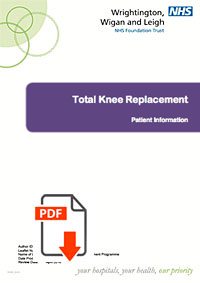Total Knee Replacement (TKR)
A Total Knee Replacement (TKR)
Who is a suitable candidate?
When all conservative and non-operative treatments and interventions fail to alleviate pain and improve function then a total knee replacement may be an option for you.
You also may be suitable for a partial knee replacement if you have knee damage only on one side of the joint. The procedure involves a smaller incision and less bone removal, only one side of your joint is replaced and this can give a shorter hospital stay and more rapid recovery.
In younger patients involved in manual work, breaking the shin bone to realign the knee joint so the weight/load is taken on the non-worn side of the knee joint is an option. (Each option will be discussed in detail with you).
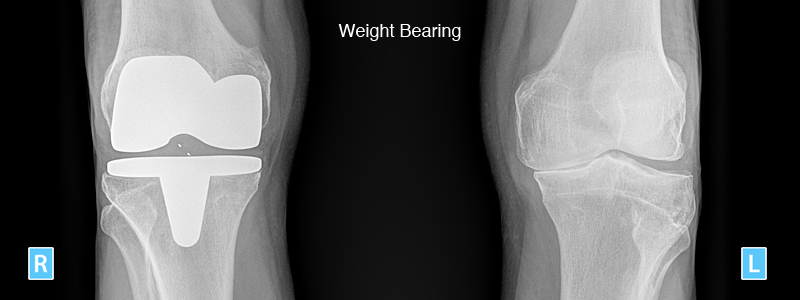
Total Knee Replacement
What types of Knee replacements are available ?
There are many different type knee replacement implants available with slight variations in design. Mr Aslam Mohammed uses implants, which are well tried and tested, with the best outcomes in the long term as documented on the National joint Registry (NJR).
Bespoke Implant Surgery
Mr Aslam Mohammed is one the very few surgeons who is able to offer bespoke Hip and Knee implant surgery. This is where the implants, jigs, cutting blocks and instruments are made specifically for your situation and planned from the CT scan that will be performed after you consultation and your decision to have this surgery. Mr Aslam Mohammed uses the Symbios implants and technique.
For more information: www.symbiosorthopaedics.co.uk
Symbios Knee Planning from CT Scan
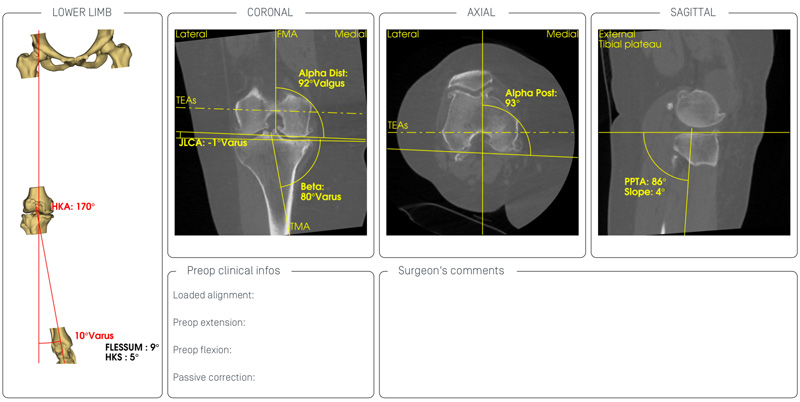
Symbios planning of completed surgery and correction of deformity
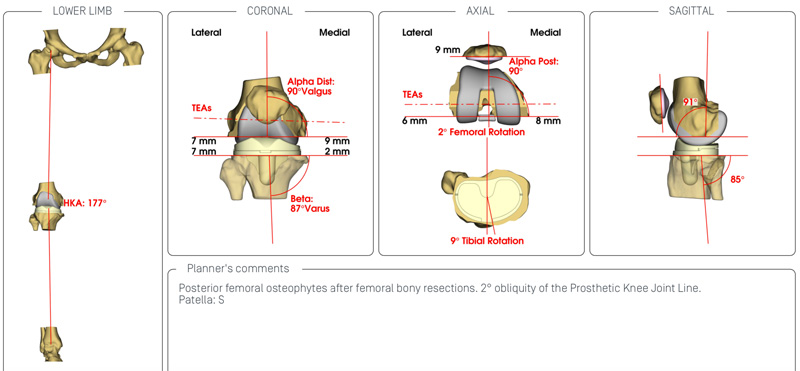
What does a knee replacement involve ?
In essence a knee replacement is a resurfacing of the worn out parts of the knee joint. Very thin slivers of bone are removed from the worn end of the femur (thigh bone) and the top end of the tibia (shin bone). This is done very accurately using manual jigs in the main. However with new developments to improve accuracy with computer navigation, use of Patient Specific Instrumentation (PSI) and Robotics have become available and are being evaluated.
The cut bone surfaces are then prepared very carefully and sized to accept the correct size knee implants, which are then usually cemented onto the bone using acrylic bone cement. Some cases will be without cement depending on the type of implant being used and bone quality (this will be discussed with you prior to your surgery). Generally speaking the patella (knee cap) is not always resurfaced (replaced); but it will be if required if necessary for a particular patient.
What are the risks?
All operations and interventions carry a risk. Measures are taken to reduce some of these risks with, pre-operative education and exercise, stopping smoking and reducing BMI can help reduce some of the risks. Antibiotics, compression stockings and blood thinning medications and early mobilisation are used routinely. Some patients are suitable for an enhanced recovery programme.
Meticulous surgical technique, attention to detail during surgery, and personalised postoperative recovery will optimise your outcome.
General risks: Anaesthetic, Cardiac, Respiratory and Stroke
Risks specific to the operation:
• Infection – superficial wound and deep joint
• Thrombosis – legs (DVT) and Pulmonary embolism (PE)
• Leg length difference, Intraoperative fracture
• Nerve and vessel damage, Complex regional pain syndrome (CRPS)
• Sensitive wounds, Residual pain and stiffness (Arthrofibrosis)
• Wearing out of the bearing surface and instability
• Implants becoming loose
• Need for revision surgery
• Over all dissatisfaction and no improvement with the surgery
What are the outcomes?
It is acknowledged from many studies that the results of total knee replacement both functionally and in terms of longevity are very good. The majority of patients have improvement of pain and most patients get back day-to-day activities. Range of movement and function tend to be improved. However, a proportion (1 in 5) of patients has on-going problems and dissatisfaction, with no obvious cause.
Functional results are maintained over time. With present day materials, bearing surfaces and surgical techniques, there is a 90% chance that your knee replacement will be functioning well at 10 years from the time of being performed and 80% chance of it doing well at 20 years. (See NJR data)
Total Knee Replacement (TKR)
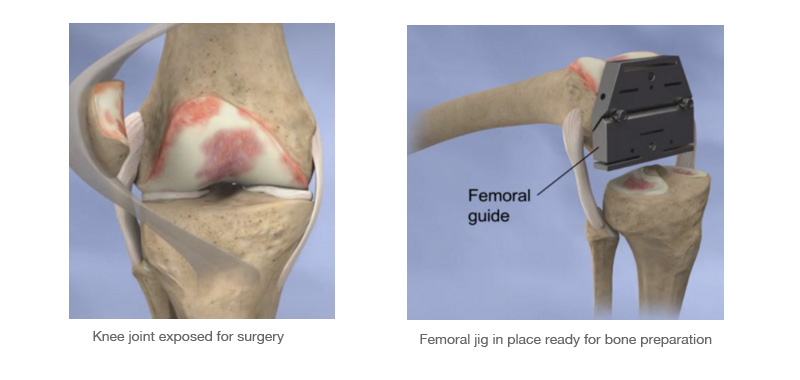
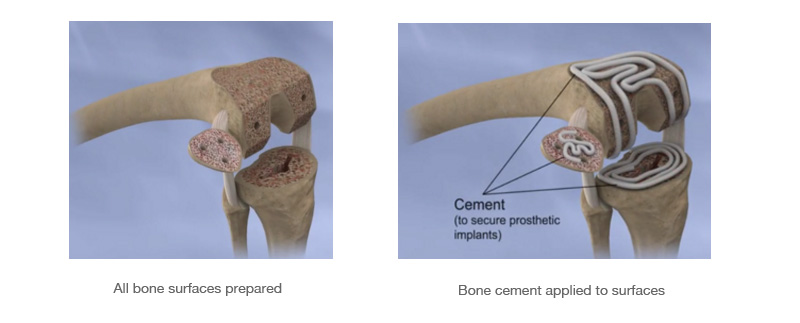
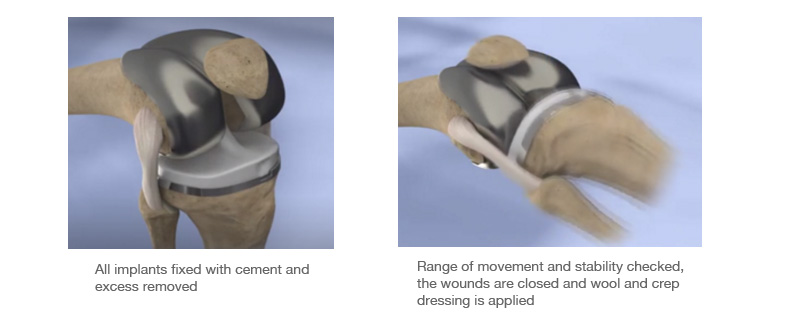
- Arthritis
- Knee Arthritis
- Knee Replacement
- Corrective High Tibial Osteotomy (HTO)
- Knee Sports Injury
- Knee Arthroscopy
- Knee Meniscus Tears
- Anterior Cruciate Ligament
- Chondral Injury / Cartilage Injury
North West Hip & Knee Clinics
Services provided:
• Keyhole (minimally invasive)
• Hip and Knee Surgery
• Hip and Knee Joint Replacement
• Hip and Knee Sports Injury
• Hip Arthroscopy, FAI and Labral Surgery
• Knee Arthroscopy - Meniscus surgery
• Knee Arthroscopy and ACL / PCL
• Ligament Reconstruction
• Biologics – PRP, Stem Cell
• Cartilage Regeneration
Mr Aslam Mohammed Consultant Hip and Knee Surgeon
